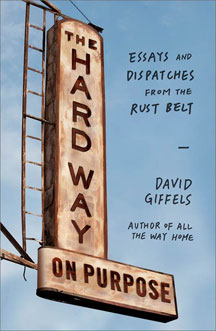
I'm a product of the American Rust Belt. Having grown up in the 1980s, I watched family members lose their jobs and friends leave the little northwestern Pennsylvania town where I lived. As teenagers, we dreamed of leaving and never coming back. And some did leave. And some of us stayed.
I was one who stayed. Well, I kinda stayed. I left to go to school (there were no local colleges in the area) and returned and then took a job just across the state border. (To be honest, my 20s was a series of small moves around three counties -- too long of a story to retell here.) I now live 45 minutes from my hometown.
In The Hard Way on Purpose: Essays and Dispatches from the Rust Belt by David Giffels, the author explores the history of his own hometown, Akron, Ohio through both memoir and observation, making personal commentaries about those who decide to stay in their struggling towns and cities. His essays are both humorous and insightful, and as a reader I found myself nodding "yes" on numerous occasions in response to his insights about the landscape and people of the Rust Belt.
The main focus of Giffels' collection is, of course, Akron, Ohio, and this can be seen as he explores the specific history of his hometown, notably discussing what happens to a city when its main industries leave, often leaving a city without an identity. In the case of Akron, these industries were Goodrich and Firestone, thus making Akron's nickname, "The Rubber City" a bit problematic. He further explores his hometown's identity by focusing on famous people including Lebron James, the music group Devo, and Chrissie Hynde.
Still, Giffels' collection doesn't just focus on other people; many of his stories are his own, cataloging his own stories and experiences. One piece titled "Popular Stories for Boys" chronicles his love of reading and his relationship with a book store owner. Another piece, "Lake Effect" describes the crazy (and sometimes harsh) weather conditions of northern Ohio.
My favorite essay, however, is titled "Do Not Cry For Me, Arizona" where he discusses the perception that some believe the term "Rust Belt" is overused, dated, and even a bit tired. To this, Giffels responds, "We need to be the Rust Belt. We've paid so dearly for that designation that we deserve to have it as our own and to allow it to represent the fullness of its story. It's our blues."
I loved The Hard Way on Purpose: Essays and Dispatches from the Rust Belt, namely because I am from the Rust Belt (although, a much more rural part), and as a reader I could see the stubborn pride that shined through Giffels' stories and recollections.
I was one who stayed. Well, I kinda stayed. I left to go to school (there were no local colleges in the area) and returned and then took a job just across the state border. (To be honest, my 20s was a series of small moves around three counties -- too long of a story to retell here.) I now live 45 minutes from my hometown.
In The Hard Way on Purpose: Essays and Dispatches from the Rust Belt by David Giffels, the author explores the history of his own hometown, Akron, Ohio through both memoir and observation, making personal commentaries about those who decide to stay in their struggling towns and cities. His essays are both humorous and insightful, and as a reader I found myself nodding "yes" on numerous occasions in response to his insights about the landscape and people of the Rust Belt.
The main focus of Giffels' collection is, of course, Akron, Ohio, and this can be seen as he explores the specific history of his hometown, notably discussing what happens to a city when its main industries leave, often leaving a city without an identity. In the case of Akron, these industries were Goodrich and Firestone, thus making Akron's nickname, "The Rubber City" a bit problematic. He further explores his hometown's identity by focusing on famous people including Lebron James, the music group Devo, and Chrissie Hynde.
Still, Giffels' collection doesn't just focus on other people; many of his stories are his own, cataloging his own stories and experiences. One piece titled "Popular Stories for Boys" chronicles his love of reading and his relationship with a book store owner. Another piece, "Lake Effect" describes the crazy (and sometimes harsh) weather conditions of northern Ohio.
My favorite essay, however, is titled "Do Not Cry For Me, Arizona" where he discusses the perception that some believe the term "Rust Belt" is overused, dated, and even a bit tired. To this, Giffels responds, "We need to be the Rust Belt. We've paid so dearly for that designation that we deserve to have it as our own and to allow it to represent the fullness of its story. It's our blues."
I loved The Hard Way on Purpose: Essays and Dispatches from the Rust Belt, namely because I am from the Rust Belt (although, a much more rural part), and as a reader I could see the stubborn pride that shined through Giffels' stories and recollections.
 RSS Feed
RSS Feed
